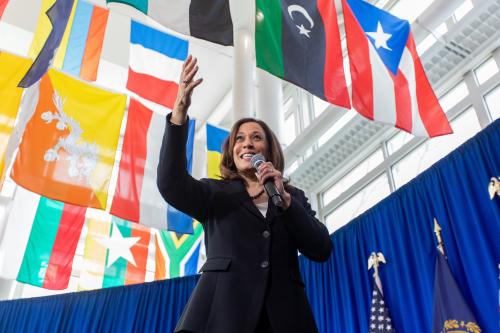This Sunday, Venezuelans go to the polls in a referendum to accept or reject a new Constitution. This is the second time that President Chavez has proposed reforms to the Venezuelan Constitution. Now, he and the National Assembly have drafted changes that significantly reform the state. Chavez’ first Constitution in 1999 embodied the socialist principles that brought him to power the previous year. It recognized the rights and privileges of historically marginalized groups, reorganized government institutions and focused on the government’s responsibility to work toward participatory democracy and social justice. Now Chavez, dissatisfied with his ‘99 Constitution calls it la bicha.
Out of the 58 reforms proposed in the ‘07 Constitution, I have identified four salient changes. The Constitution will create a new structure for grassroots communal councils based on Poder Popular (People Power), it authorizes State funding of elections, terminates the autonomy of the Central Bank, ensures that the President can be reelected for as long as he desires, and make it far harder to remove the President through a recall referendum. This Constitution goes beyond the socialist principles of the ‘99 Constitution and provides the legal basis for concentrated presidential power as well as a supportive grassroots constituency with its own source of funding, derived from oil revenues. Multiple democratic institutions will be placed increasingly under the authoritarian power of the presidency.
Last week, five new polls indicated that a majority of the Venezuelan people will vote against the proposed Constitution. Alfredo Keller’s poll has 28% of Venezuelans in favor of the changes and 59% rejecting them. Other polls give a narrower margin with Datanalisis giving just under 40% to those in favor and 50% against the changes. We should expect that President Chavez will make a huge effort to bring out his supporters to turn the tide in his favor. Despite recent poll numbers, Chavez may gain approval for his ‘07 Constitution whether by fair means or foul. Why should we care?
The reform with the most long term significance is the proposed creation of People’s Power Councils which will devise and execute projects for the benefit of the community. On its face, this is a democratic reform intended to give the people, known as Poder Popular a political role in their communities, as well as judicial role as Justices of the Peace. These roles are reminiscent of the Cuban Committees for the Defense of the Revolution (CCDR) created to ensure a system of grassroots vigilance that extended government surveillance to the neighborhood level. The CCDR created an atmosphere of suspicion, if not fear, among ordinary people going about their daily lives.
To avoid competition with existing institutions, such as the municipality and federal states, Article 16 of the new Constitution gives the President the right to appoint and remove administrators of these traditional organizations, while Article 184 grants representatives of the community, students, workers, co-operatives and producer networks the right to elect the People’s Power Councils. Furthermore, these Councils will have the responsibility to insure peace and order. Consequently, Hugo Chavez will have the power to weaken existing state institutions and assure that the new Councils gain in strength and influence. The ‘07 Constitution, if approved, ensures that the People’s Power Councils will be the basic political units of the State. Also, Article 167 establishes a People’s Power National Fund to ensure the transfer of at least 5% of oil revenues to the Councils, but the law to ensure proper use of these monies has still to be drafted.
Second, under the ‘99 Constitution, the State is prohibited from funding associations having political purposes or persons who participate in electoral processes. Under Article 67 of the proposed Constitution, the State is permitted to fund electoral activities and will regulate private contributions to political associations. State funding can tilt the balance in favor of Presidential supporters, or cronies and make it harder for independent opposition candidates like Leopoldo Lopez, the Mayor of Chacao, to compete for the Presidency.
Third, no longer will the Venezuelan Central Bank be an autonomous institution, ensuring the stability of the Bolivar, the national currency. Instead, the proposed reform of Article 318 places the Central Bank under the direct control of the Presidency to ensure that reserves are used to meet current economic needs. No longer will reserves be accumulated to guarantee the value of the Bolivar, but some $6 billion will be directed to social programs. President Chavez has created his own savings pool with minimum, if any, accountability on its use.
Fourth, and most blatant of all, the ‘99 Constitutions limitation of a six year presidential term and a one time re-election – permitting Chavez to remain in power until 2012 – disappears. In its place, the new Article 230 allows the President a seven year term with no limit on re-election. Hugo Chavez can enjoy the prospect of an eternal Presidency.
Sunday’s referendum gives the Venezuelan people the choice of continuing with their socialist charter, or choosing to give their President dictatorial powers. If the referendum approves the reforms, it will become much harder to remove the President from office through the use of a recall referendum. This significant feature of Venezuelan democracy is being destroyed and when the people discover their loss of power, it maybe too late to take peaceful, democratic and negotiated action to reverse their losses.
Growing opposition to the proposed Constitution indicates that these concerns are known and felt by the Venezuelan voters. However, they should not abstain as they have done in the past, but come out to express their commitment to democratic principles.


Commentary
Op-edVenezuelan Constitution: From a Socialist Charter to Authoritarian Rule
November 30, 2007